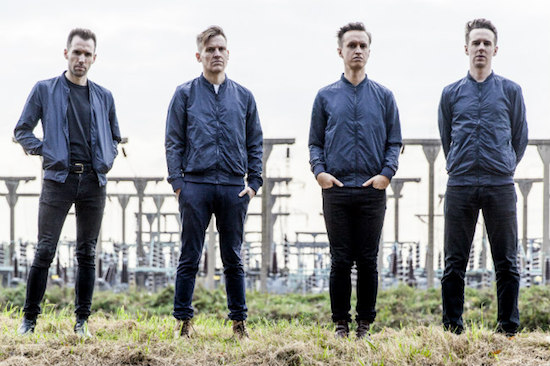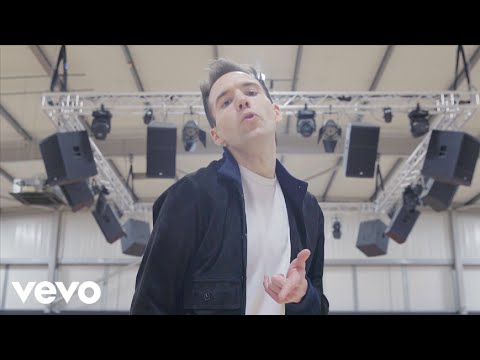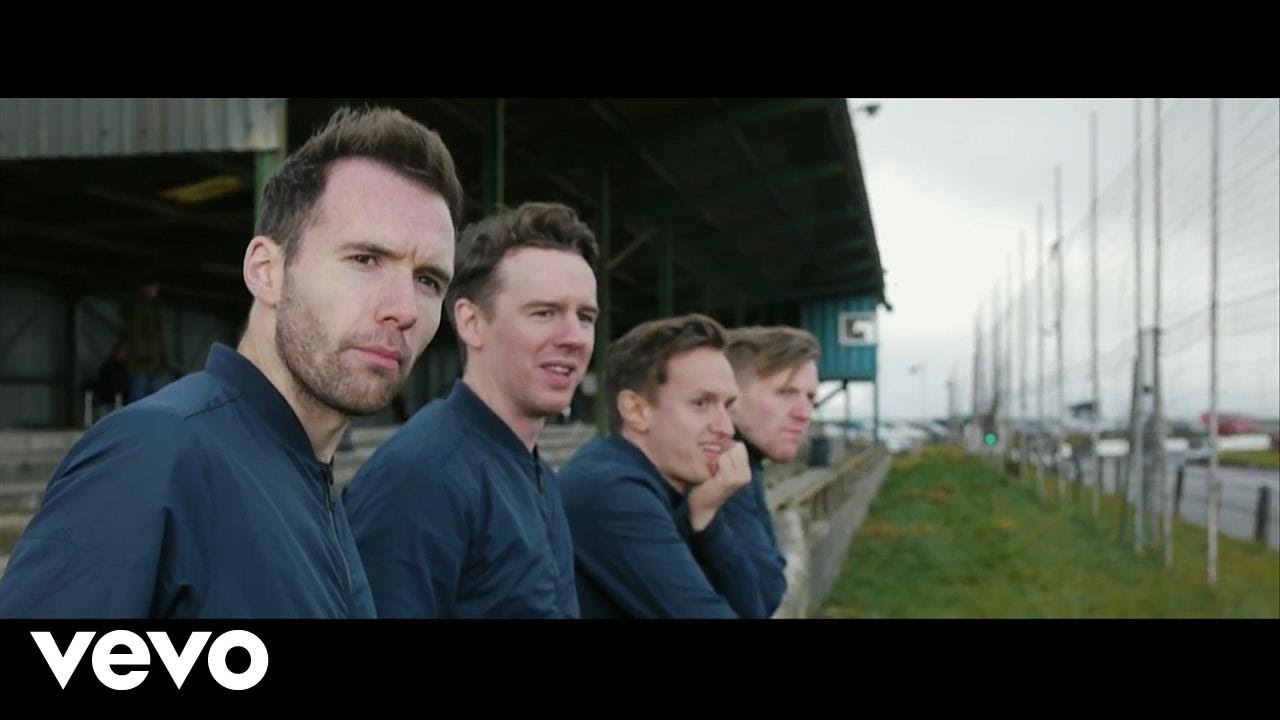Portrait by Sebastian Matthes
It’s a Sunday afternoon at a karting track nestling in the bowels of Manchester Arena. To celebrate the release of their fifth album, the wondrous twitching funk-rock of Big Balloon, Dutch Uncles have invited fans, family, friends and yours truly to race against them in whizzy electric go-karts, inspired by the stock-car racing video for lead single, ‘Big Balloon’.
Resplendent in matching black-and-green overalls, and looking like a dubious Daft Punk tribute act, the four Duncles have split themselves across the two planned races. I am racing against drummer Andrew Proudfoot and guitarist Peter Broadhead. If my competitive streak wants to beat a Dutch Uncle, the other race would have been better – singer Duncan Wallis has never had even a single driving lesson and bassist (and principal songwriter) Robin Richards tells me he is a “very cautious driver.”
After zipping round the track for 15 carefree minutes – and being black-flagged for “aggressive contact” (ageing reflexes is my pitiful excuse) – I bask in the warmth of a minor triumph. I have finished ahead of Andrew. However, Peter is a speedy bugger and it turns out that non-driver Duncan manages an improbable second place amongst his stunned bandmates.
The night before, Dutch Uncles are in the more familiar surrounds of Low Four, a recording studio huddled within the Old Granada Studios complex in Manchester. They’ve invited 100 punters to watch them record a live set for an internet TV channel in the very room that Big Balloon was birthed. Opening with the title track, and with Wallis showcasing some updated trademark dance moves, the band pick their way through some of the new album’s many highlights, be it the retro funk of ‘Streetlight’, the Prince-aping ‘Oh Yeah’ or the glitchy pop of ‘Same Plane Dream’. We also get a cover version of The Blue Nile’s ‘Stay’ and a blistering version of fan-favourite, ‘Flexxin’, before the lads mingle into the crowd to sign new albums hot off the vinyl press.
After the show, Duncan and I reminisce about previous interviews we’ve done for tQ. I last met up with him to discuss the band’s previous album, 2015’s O Shudder. As we chat, I get the impression that Duncan is not exactly enamoured to the record and that the new material is an attempt to get the band back on track. Duncan need not fret; Big Balloon is their finest album of their decade-long career and takes Dutch Uncles up another gear.
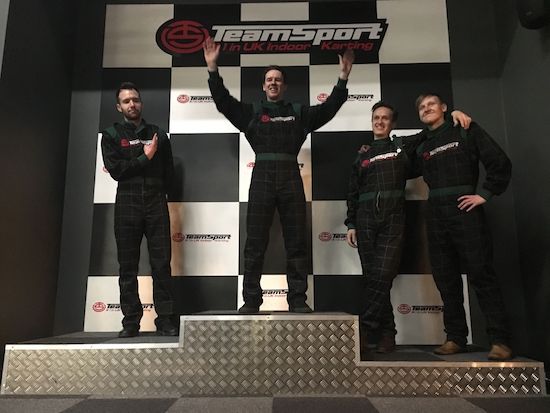
Before we begin to discuss the new album, I’m intrigued by your comment to me about O Shudder sounding “alien.” Why does it sound alien?
Duncan Wallis: I was listening to O Shudder a few weeks ago. Especially on the second half, the songs sounded so alien to me and I almost didn’t recognise it as us. It felt like I wasn’t listening to my band. I was amazed at how we came to write a song like ‘Be Right Back’ – an agnostic funk track about existential despair. I remember trying to do a Marvin Gaye moment on that track, with a load of background noise like there was a party going on. It left me wondering how the hell we got so deep into that rabbit hole.
Robin Richards: I think with O Shudder, we were, perhaps, trying to emulate our contemporaries – friends of ours who had been successful and had a certain sound and production ideal. Then the album maybe didn’t do as well as we thought it would. So, we decided to home in on what we think we do best and what comes more naturally to us.
As discussed in our previous interview for tQ, the lyrical content of O Shudder was particularly personal. Looking back, did that level of openness have any ramifications?
DW: It did. I felt my words were too obviously honest. I had made my Adrian Mole record, but not in an endearing way. This is a challenge when you are attracted to very honest music. If I think about Blue by Joni Mitchell (an honest and heartfelt record), there is such an incredible story going on at that point in her life. I was trying to do that with O Shudder, but I didn’t have anything to attach it to. All that has happened in our lives is that we have kept going. You need to have a life event and because there wasn’t any of that, I kept the light on myself and it made O Shudder feel a little indulgent at times.
There was also a major change during the days after the release of O Shudder, with [guitarist] Daniel ‘Sped’ Spedding leaving the band. What impact did his departure have on Dutch Uncles?
DW: Basically, Sped wasn’t enjoying himself. He left days before we did a short tour of instore gigs. You were at the first one in Manchester and I remember having to bring up the fact he had left. I was shaking on stage. I hadn’t prepared anything to say to the audience and I didn’t realise I would feel quite that emotional. We had to admit that we had failed a friendship on both sides and, unfortunately, it becomes public knowledge as people would see he wasn’t with us. However, while the first explanation in Manchester was hard, by the seventh instore gig it was just a case of “life goes on.” For us, we almost had to swallow the incident and the sooner we could get over it, by touring, the better.
So, a guitarist leaves, and you make a more guitar-driven next album.
DW: We wanted to look that challenge in the face. With our guitarist having left, we assumed people would expect us to steer away from guitars, so we decided to do the opposite of that.
RR: Also, when touring O Shudder, we played a number of songs from the first two albums and the guitar-heavy songs were going down really well. We were enjoying playing them and that influenced the new songs.
So, I am hearing that you weren’t entirely happy with O Shudder. In light of that, what was the initial approach to making Big Balloon?
DW: It was about simplifying the process. We had a lot more determination to write this album than the last one. That’s what happens when you feel that you have gone a bit off the rails. There was a grit and determination to get back on the rails. We also knew we had to slim down our production. With O Shudder, we had Brendan [Williams] in producing the album from day one. Every time a new demo came through, he was there listening with us for the first time. For Big Balloon, we still got Brendan involved at Low Four Studio, but we knew that our time there would be so limited, that we would have to make sure we had a virtually finished product by the time we took it to Brendan. For the track ‘Big Balloon’, all he did was take my vocal line on the chorus and move it to starting on the first beat as opposed to starting on the third beat. It was a subtle change but made it a much bigger chorus and was a masterful stroke of production genius on a song that was pretty much finished.
Do you enjoy the recording process?
DW: Not really. I find the process of recording an album to be a very stoic environment. I find the studio a very restrictive atmosphere, which is why I change the lyrics of older songs when we play them live. If a lyric falls out of favour with me, or it doesn’t feel suitable anymore, I will change it. It’s like The Simpsons episode in which Krusty tells Red Hot Chili Peppers to change a line in one of their songs. So, I like that when these songs are live, they can still change. And, I just don’t like being in the studio.
Robin, last year you released the score to the film Birdsong: Stories From Pripyat after visiting Chernobyl [Robin’s hometown of Stockport has close ties with charities connected to the 1986 disaster]. How did the trip to the Ukraine and the project influence your writing for Big Balloon?
RR: It was a concept I had had in mind for a while and I had been discussing it with a visual artist called Clara Casian for a number of months. So, when we got the Arts Council funding, I knew I would be working on that project at the same time as this Dutch Uncles’ record, and it would be a busy year. And, of course, going out to Chernobyl was awe-inspiring in terms of writing music for the film. It was the birdsong that I heard at Chernobyl that became the main motif for the piece. On the last night in Kiev, we went to a nightclub and I absolutely loved the Eastern European techno that was being played. Maybe it was the vodka I was drinking, but I kind of got lost in the moment. I was out with Clara, who is Romanian, and our Portuguese cameraman and I knew that no one would ever know about the night apart from them. I loved it. When I returned, I told Duncan about the night.
DW: I wanted Robin to write a song for some lyrics about having a good time somewhere else. Basically, last year I spent a lot of time touring with Stealing Sheep. I met a lot of new people and I almost moved to Liverpool at one point. So, I wanted Robin to write a song about moving to a new place. So, he wrote the song ‘Sink’ that was inspired by the Ukrainian trip.
Is Big Balloon is your most accessible album to date?
DW: Well, we are trying to make more sense. I did want to simplify and condense the process and get a little back to the old days. Anyone can listen to a song like ‘Streetlight’ and recognise that it is about a guy singing a song from his bedroom about the streetlight outside, and realising he is back at an emotional zero in his life.
How easy it is to ‘simplify and condense’?
DW: It’s not easy for us. Any song that was taking longer than a month to get both the music and the lyric was difficult, whereas ‘Big Balloon’ was written in five minutes. If the process is painless for us, it will be painless for the listener. However, we did spend over 14 months writing this album. We had a lot of ideas – there were other songs that had a quick turnaround, but didn’t have the conviction we required to be on the album. We were waiting for ten moments of absolute magic – and you can be waiting a long time for that.
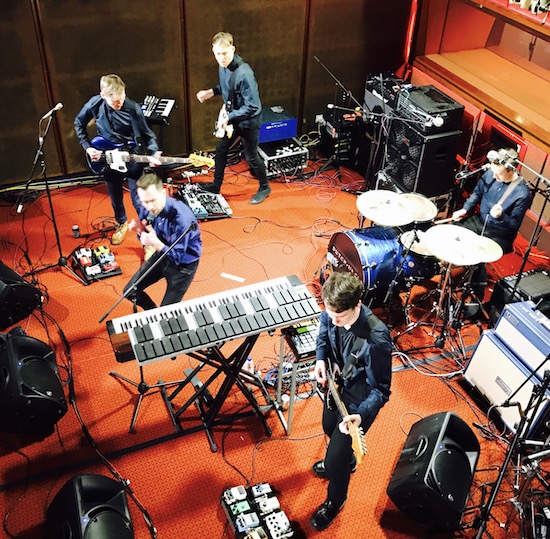
Turning to the lyrical themes on Big Balloon, I saw that Sleaford Mods joyfully tweeted about one of your songs being about austerity. How political is the new album?
DW: There are some directly political moments on the album. The song ‘Same Plane Dream’ was inspired by my uncle who died recently. He was only in his mid-50s and was on benefits for the last 15 years of his life. His life had unravelled and he was down on his luck. It was horrible to see him dying of terminal lung cancer at a time when people in his position were being completely demonised. It got me really angry: the whole hypocrisy of someone like Iain Duncan Smith saying people can live on £50 per week while, in the very week he made that comment, he spent £40 on a hotel breakfast. How the fuck can our country be run by people who are not even attempting to cover their tracks on such hypocrisy? So, ‘Same Plane Dream’ is about the mentality of people in my uncle’s position. If you make people at the bottom feel bad about being at the bottom, it becomes their natural position. It’s a simple idea and, in many ways, shouldn’t have to be pointed out.
In these particularly turbulent political times, is there a big temptation for you to make political statements in your music?
DW: There is a drive to speak out about things, but at the same time, for musicians to step into overly political areas, you have to be as clean as a politician. You cannot compromise your image by doing a photo shoot for some glossy brand. If you are going to be political, you have to be like Sleaford Mods and live it.
RR: We will draw the line on endorsing anything that is pro-Trump. So, we’d now never accept New Balance trainers [laughs].
I wanted to ask you about the experience of touring with Paramore a couple of years back – a band I once interviewed assuming they were ridiculous Disney rock, but ending up respecting as people. Dutch Uncles seem an odd fit as their tour support, how did the opportunity come about?
RR: It came about because Taylor [York] is a huge fan. They had gone through a change in line-up and Taylor had taken on writing duties. They did an interview, in which they cited us and Alt-J as huge influences on their album Paramore. So, when he met him, it was him who was quite taken aback – which was weird.
DW: Going on tour with Paramore, was one of those ‘flying too close to the sun’ moments. For the last few gigs, we would eat in the canteen with Paramore. It was funny – Jeremy [Davis], who played bass for them at that time, would always tell us the same story every day about having a house near Bristol that needed some bamboo removing from the garden and did we know any gardeners. He kept going on about his bamboo. He would tell us this every day and I felt I was getting a unique insight of what the treadmill of touring is like for a band as big as Paramore.
As a fellow Prince fanatic, I couldn’t let our interview pass without asking how his death impacted the new album.
DW: Prince’s death made me angry. I remember DJ’ing the day after he died and played a Prince-only set. I had people coming up to me saying, “What’s this shit?” and I was like, “Get out – don’t even fucking start.” Maybe that fuelled my creative fire. ‘Oh Yeah’ is our Prince moment on the album. It has a similar beat to ‘Let’s Go Crazy’ but it is not – definitely not – ‘Let’s Go Crazy’. I am really pleased with it. The fact we got to rip-off Prince again was also great.
Apparently, Big Balloon is also inspired by some “unfashionable records belong to your Dads.” What were these records?
RR: Stuff like Gentle Giant, Focus and early King Crimson. Duncan was very annoyed that we have been playing ‘Hocus Pocus’ by Focus in the practice room.
DW: Only because, if I wanted to take part, I would have to yodel.
RR: I find that with prog rock, if you can cut out some of unnecessary parts, there are some amazing nuggets. There are some great tunes.
DW: My ‘dad record’ was The Blue Nile’s second album, Hats. It is a very simple, brilliant and melancholic album. I was sitting in on Hannah Peel’s Marc Riley session recently and we were saying that we should form a Blue Nile society for songwriters obsessed with Paul Buchanan’s work. We could get a covers band going.
Finally, have you succeeded? Have you made the definitive Dutch Uncles album?
RR: I think so. We wanted to write the quintessential Dutch Uncles album that encapsulated the last ten years.
DW: So, in an Alan Partridge-esque manner, I note the chiming criticism across some of the reviews that the album is touching on the predictable. That is exactly what I wanted. Personally, I am not going to stop doing this until we cannot sell a single ticket in Manchester. I am going to see this out to the absolute bitter end and it will be a disgusting and disgraceful way to go out. Therefore, I wanted us to get back on track – and then we might decide to veer off again.
Big Balloon is out now via Memphis Industries. For details of Dutch Uncles’ UK tour, click here. Thanks to Tearm Sport Manchester for the go-karting

